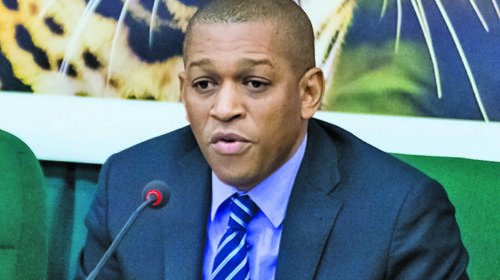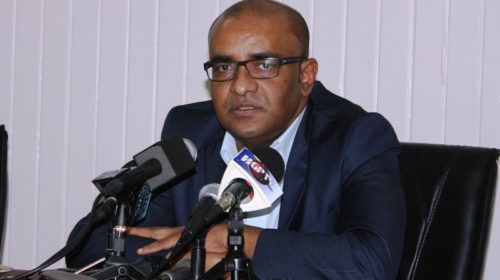

Opposition Leader Bharrat Jagdeo is of the belief that Guyana has become a laughing stock on the international stage owing to the gross incompetence the coalition Government and top officials continue to portray.
He was at the time speaking about statements made by Head of the Department of Energy, Dr Mark Bynoe, during an interview with the New York-based Bloomberg.
The August 13, 2019 article titled “The World’s Newest Petrostate Isn’t Ready for a Tsunami of Cash” states: “When Mark Bynoe, the director of Guyana’s Department of Energy, was a boy, he used to play cricket barefoot with friends in his village outside Georgetown. At the end of the day, his feet “would be shiny at the bottom,” he remembers. “We knew oil was around.”
Statements like this, Jagdeo pointed out, highlights the incompetence of the governing coalition.
“This is the person who heads our Department of Energy, giving an interview to Bloomberg which is the premier business and economic news [agency] and is read around the world. When the Head of our Energy Department makes such a statement, you recognise how sad our situation is about the state of affairs in our country.
“I can imagine how people around the world, when they read this, how they think of Guyana – how disparaging their views may be about our country. It is the same incompetence and comical actions on the part of the Government that causes so little respect for Guyana and our people,” the Opposition Leader stated.
He went on to say that this was the same sort of incompetence that took the country into the negotiation of contracts with United States oil giant ExxonMobil and British-based Tullow Oil, which saw Guyana being short-changed.
“So, this is the tragedy of Guyana today – having an incompetent government in place that squanders all of the opportunities for the future of all Guyanese and we’ve become the laughing stock of the international community when key Government officials – imagine the person that is in charge of our total Energy Department and policy makes a statement like this. His foot bottom was ‘shiny’ so he knew we had oil,” Jagdeo posited.
The Opposition Leader, who is also a former President, said that this sort of incompetence “pains” him, especially since Guyana once had a reputation as a pioneering country.
“We had a growing reputation for leading the world, almost, on green policy-making and pioneering the sale of forest carbon around the world. That was our reputation; people used to quote what we’re doing in Guyana prior to the oil and gas find. And today to be reduced to a laughing stock because of the incompetence of the Government … it pains me,” he lamented.
Jagdeo has always been critical of the coalition Government’s failure to negotiate a better deal with Exxon and more recently, his criticism was directed at the contract with Tullow, which will see the company paying zero royalties. This is despite the contract with the British company being signed after oil had already been discovered in commercial quantities offshore Guyana, Jagdeo contended.
But Tullow has defended recovering the one per cent royalty it pays to Guyana through cost oil, saying it is consistent with international frontier exploration standards.
In an interview with Guyana Times International last month, the British oil company’s Head of Media Relations, George Cazenove reminded that back in 2012, Tullow and its partners spent and lost over US$100 million on a failed exploration well in Guyana.
“What I can say is that our licence is entirely in line with licences around the world in frontier exploration areas. Don’t forget that the Jethro well had a one-in-four chance of success at our risk. And we know what it’s like to lose money in exploration – we and our partners spent US$185 million in Guyana in 2012 on the Jaguar well and, as per our licence, got nothing back,” Cazenove had said.
Experts have argued for some time that the Guyana Government has not done enough to include ring-fencing provisions within the oil contracts it signed with operators. Ring-fencing terms ensure that liabilities (losses) associated with a company’s asset, in this case a previous well, cannot be transferred and the costs recouped from another well.
Tullow’s one per cent royalty, itself, has been criticised in recent times for the very amount. It falls short of the two per cent ExxonMobil has to pay to Guyana. When compared to oil producers around the world, however, the rate falls even shorter.
While some oil producers did start with low royalty rates similar to Guyana’s, their respective governments had the foresight to include provisions in their contracts for a sliding scale that would ensure the royalty rate went up as oil production increased.
On August 12, the British oil company announced that it discovered oil in commercial quantities at the Jethro-1 exploration well in the Orinduik Block. This is the first discovery in the Orinduik Block, which is located in close proximity to the Stabroek Block – where ExxonMobil has already made 13 lucrative oil discoveries since 2015.
The US oil giant is gearing up for oil production in the first quarter of next year, producing up to 120,000 barrels of oil per day from the Liza Phase 1 development.



